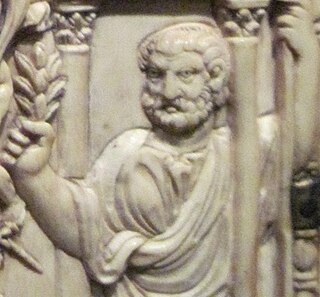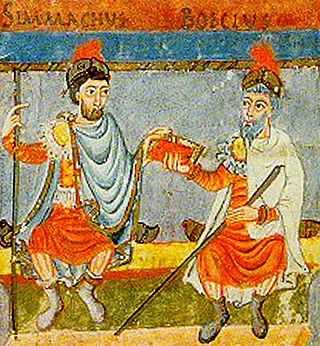Symmachus is a name from Roman antiquity. It may refer to:

Quintus Aurelius Symmachus signo Eusebius was a Roman statesman, orator, and man of letters. He held the offices of governor of proconsular Africa in 373, urban prefect of Rome in 384 and 385, and consul in 391. Symmachus sought to preserve the traditional religions of Rome at a time when the aristocracy was converting to Christianity, and led an unsuccessful delegation of protest against Emperor Gratian's order to remove the Altar of Victory from the curia, the principal meeting place of the Roman Senate in the Forum Romanum. Two years later he made a famous appeal to Gratian's successor, Valentinian II, in a dispatch that was rebutted by Ambrose, the bishop of Milan. Symmachus's career was temporarily derailed when he supported the short-lived usurper Magnus Maximus, but he was rehabilitated and three years later appointed consul. After the death of Theodosius I, he became an ally of Stilicho, the guardian of emperor Honorius. In collaboration with Stilicho he was able to restore some of the legislative powers of the Senate. Much of his writing has survived: nine books of letters; a collection of Relationes or official dispatches; and fragments of various orations.

The gens Aurelia was a plebeian family at ancient Rome, which flourished from the third century BC to the latest period of the Empire. The first of the Aurelian gens to obtain the consulship was Gaius Aurelius Cotta in 252 BC. From then to the end of the Republic, the Aurelii supplied many distinguished statesmen, before entering a period of relative obscurity under the early emperors. In the latter part of the first century, a family of the Aurelii rose to prominence, obtaining patrician status, and eventually the throne itself. A series of emperors belonged to this family, through birth or adoption, including Marcus Aurelius and the members of the Severan dynasty.

Quintus Aurelius Memmius Symmachus was a 6th-century Roman aristocrat, an historian and a supporter of Nicene Christianity. He was a patron of secular learning, and became the consul for the year 485. He supported Pope Symmachus in the schism over the Popes' election, and was executed with his son-in-law Boethius after being charged with treason.

Flavius Hannibalianus was a member of the Constantinian dynasty, which ruled over the Roman Empire in the 4th century AD.
Virius Nicomachus Flavianus was a grammarian, a historian and a politician of the Roman Empire.
Nicomachus Flavianus, sometimes referred to as Flavianus the Younger, was a grammarian and a politician of the Roman Empire. He was the son of Virius Nicomachus Flavianus. He held several offices under emperors Valentinian II (371–392), Theodosius I (379–395), Honorius (393–423), and Valentinian III (425–455); together with his father he supported the usurper Eugenius until his defeat and death (392–394). Flavianus also edited a corrected version of Livy's work.

Quintus Fabius Memmius Symmachus was a politician of the Roman empire, member of the influential family of the Symmachi.
The Aurelii Symmachi were an aristocratic senatorial family (gens) of the late Roman Empire.
Aurelius Valerius Symmachus Tullianus was a Roman senator and aristocrat. He was appointed consul in 330 by the emperor Constantine.
Lucius Aurelius Avianius SymmachussignoPhosphorius was an aristocrat of the Roman Empire, and father of Quintus Aurelius Symmachus.
Aurelius Anicius Symmachus was a politician of the Western Roman Empire belonging to the Roman families of the Anicii and of the Symmachi. In 415 he was proconsul of Africa and between 24 December 418 and January 420 he was praefectus urbi of Rome.
Gabinius Barbarus Pompeianus was a politician of the Western Roman Empire, praefectus urbi of Rome during the first siege of Alaric I.
Flavius Paulinus was a Roman politician during the reign of Theodoric the Great, and was appointed consul for the year 498.
Flavius Neoterius was a politician of the Roman Empire. He served as Praetorian prefect of the East, of Italy, and of Gaul. In 390 he was co-consul with Valentinian II.
Aurelius Celsinus was a politician of the Roman Empire.

Nar. Manlius Boethius was a Roman and Italian aristocrat, who was appointed consul for 487. He was likely the father of the Roman philosopher, Boethius.
Rufius Postumius Festus was a Roman aristocrat who lived during the Late Roman Empire. Festus was the last consul appointed by an Emperor in the West. The next consul appointed in the West was Caecina Decius Maximus Basilius, whom king Odoacer appointed in 480, eight years after Festus.
Memmius Vitrasius OrfitussignoHonorius was a Roman politician.